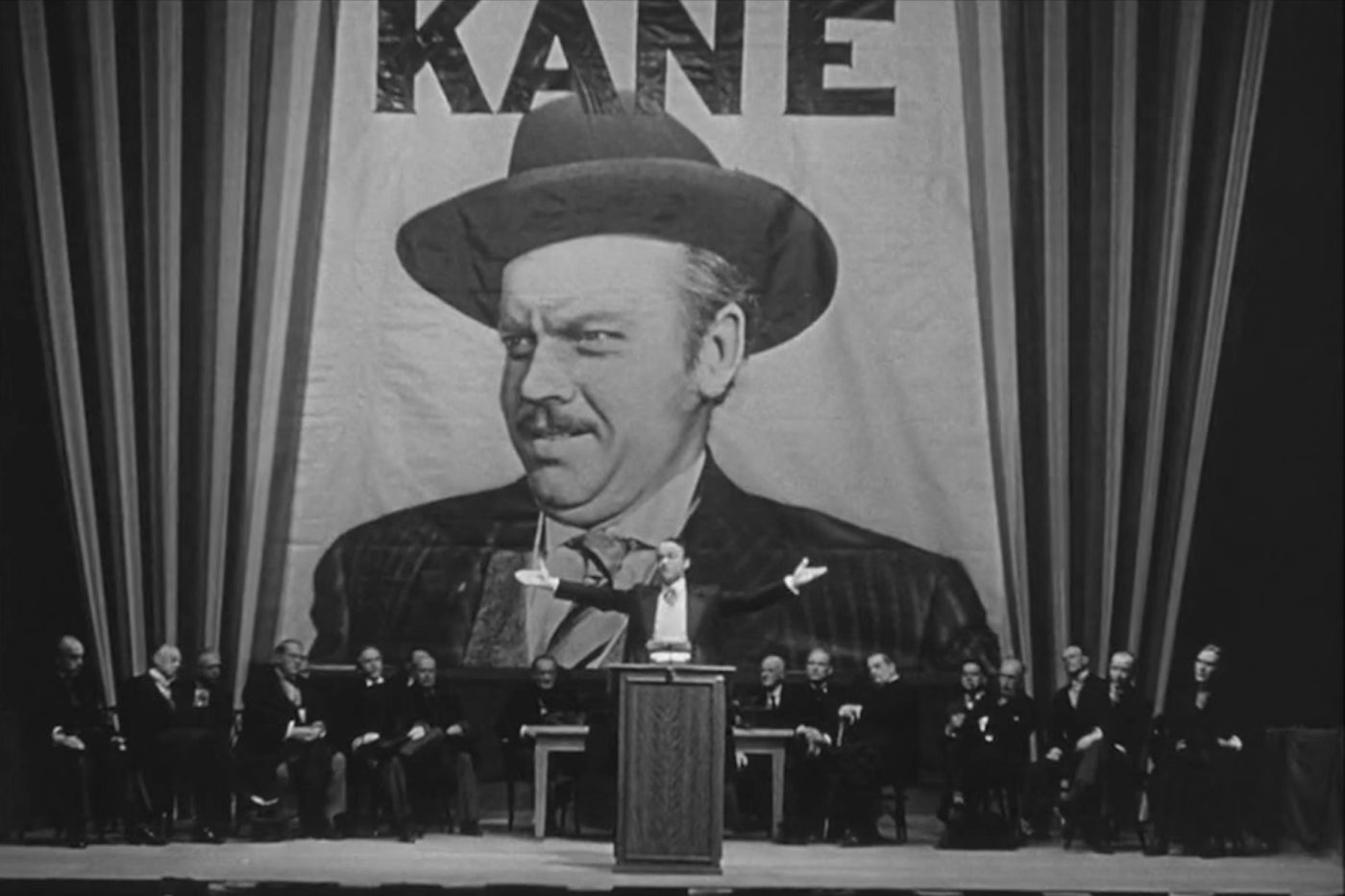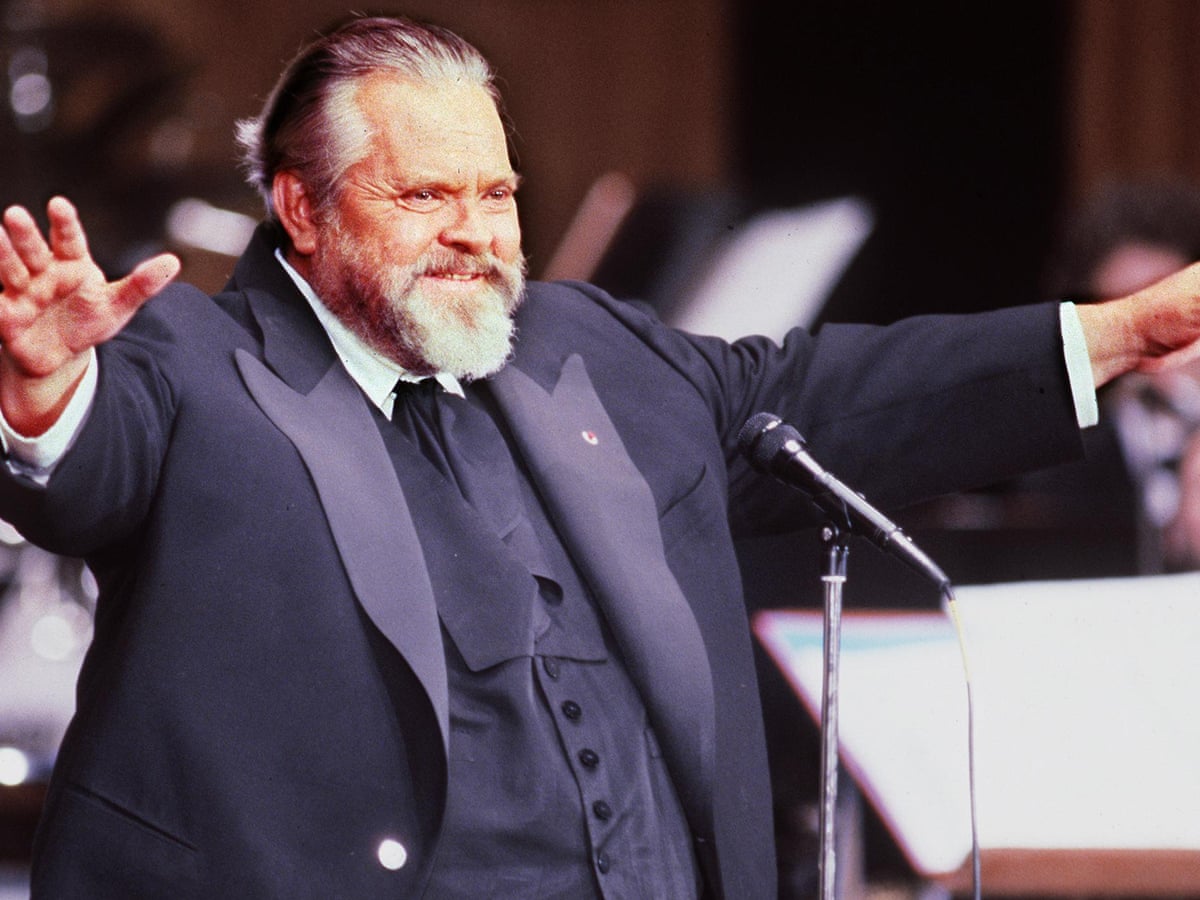Welles, 25, as Kane, 53, in 1916
May 1, 1941, 80 years ago: The film Citizen Kane premieres in New York, at the Palace Theatre at 1564 Broadway at 47th Street. (The Palace opened in 1913, became a byword of the vaudeville era, and is currently undergoing a renovation that will keep it operational long after things fully restart after COVID.)
Orson Welles, a few days short of his 26th birthday, and 2 1/2 years past his famous War of the Worlds national broadcast over CBS radio, is the film's star, its director, its producer, and co-writer of its screenplay along with Herman Mankiewicz. Bernard Herrmann wrote and conducted the music for it.
Welles plays Charles Foster Kane, a newspaper magnate who starts his career as a liberal crusader, but is corrupted, piece by piece, until he loses everything he cares about, except his fame. You might say that Kane spends the movie breaking bad.
Actually -- Spoiler Alert for an 80-year-old movie -- Kane begins the movie by dying, saying one word: "Rosebud." A newsreel gives the details of Kane's life, starting in Colorado in 1863, where he inherited a gold mine that makes him fabulously wealthy. He gets full title to it as he grows up, and buys a newspaper.
The man who acted as his legal guardian, and now manages his finances, doesn't like how Kane is using the newspaper, and tells him that he lost a million dollars last year (1893 -- about $30 million in today's money). Kane says, "At the rate I'm going, I'm going to have to close this paper down in about 60 years."
Welles, 25, as Kane, 30, in 1893,
delivering that classic line
He starts out with good intentions; a good friend, Jedediah Leland, played by Joseph Cotten; a good business manager for his paper, Mr. Bernstein, played by Everett Sloane; and a good wife, Emily, niece of a President, played by Ruth Warrick. It was Warrick's 1st film, but Cotten and Sloane had previously worked with Welles on radio with his Mercury Theatre of the Air.
But his desire to sell more newspapers, even after his New York Inquirer becomes the biggest-selling paper in the country, is insatiable. He uses his paper to start the Spanish-American War in 1898, which in turns helps him sell more papers than ever, and he doesn't seem to care about the cost.
Kane runs for Governor of New York in 1916, promising to crack down on the corrupt Tammany Hall political machine -- meaning the Democratic Party, meaning Kane is running as a Republican. In real life, Woodrow Wilson was re-elected President that year, but by a very slim margin, with no "coattails," and the Governor, a Republican named Charles S. Whitman, was re-elected. But Kane loses, because his affair with a showgirl is exposed. He never runs for office again.
He divorces Emily, and marries the showgirl, Susan Alexander, played by Dorothy Comingore. She ends up hating him as much as Emily did. He loses a big chunk of his fortune in the stock market crash of 1929. Soon, he's all alone in his castle on his estate in Florida, with all the expensive stuff he's collected over the years.
Welles, 25, as Kane, 70, in 1933
As Mr. Bernstein told the reporter investigating Kane's last word, "Mr. Kane was a man who lost everything he had. Perhaps 'Rosebud' was something he lost." He proves to have come closer than anybody else to getting it right: In the film's last scene, after the reporter has given up, workmen are seen tossing some things into a furnace. One is the sled he had as a child, with the name "ROSEBUD" on it. That sled represented the life had before he got rich and things got complicated.
*
Citizen Kane is regarded as one of the greatest movies ever made. The camera tricks and editing tricks that Kane and editor Robert Wise used were groundbreaking -- sometimes literally, as holes were cut in the soundstage floor to get some shots.
But it wasn't regarded as a great film at first. In fact, it tanked. Why? Because William Randolph Hearst, a real-life media baron, thought it hit too close to home. Kane used three names, was wealthy through his family's mining fortune, bought a struggling newspaper, turned it into a media empire, used it to egg the federal government on into starting the Spanish-American War, became an isolationist in the run-ups to World Wars I and II, built a castle full of his weird art collections and even had a zoo on the property, and ended his first marriage with an affair with an actress -- the joke, never proven, was that Hearst called a certain part of Marion Davies' anatomy "Rosebud."
There were, of course, significant differences. The Hearst family was already rich when he was born, he started across the country in San Francisco before moving east to New York (with the Journal), he actually won an election (3, in fact, for the U.S. House of Representatives, but never got closer to the Presidency than that), his castle was in California instead of Florida; and, of course, Hearst was still alive and still fabulously wealthy.
And he used that wealth and influence to stop Citizen Kane. He told the theater chain he owned not to screen it. He told the newspapers and radio stations he owned to give it bad reviews. His wishes were carried out.
When the 1942 Academy Award nominations when out, Citizen Kane got 9 of them. But when the Awards were announced, it got only one "Oscar," to Welles and Mankiewicz, for Best Screenplay. Best Picture went to How Green Was My Valley. A dumb choice: The other nominees included Here Comes Mr. Jordan, Hold Back the Dawn, The Little Foxes, The Maltese Falcon, Sergeant York and Suspicion, so there were plenty of good choices, and Citizen Kane never had a chance.
For Best Actor, Welles was up against Cary Grant for Penny Serenade, Walter Huston for All That Money Can Buy, Robert Montgomery for Here Comes Mr. Jordan, and Gary Cooper, who won for playing Sergeant York. Also a tough category, and I can't blame the Academy for picking someone other than Welles.
Welles, directing a film for the 1st time, was also up against some heavyweights for Best Director: Alexander Hall for Here Comes Mr. Jordan, William Wyler for The Little Foxes, Howard Hawks for Sergeant York, and John Ford, who ended up winning, for How Green Was My Valley. Ford was worthy of several considerations for Best Director, but this was not one of them. Here, Welles got robbed, and if you think Hearst had nothing to do with influencing the Academy's vote, I've got bridges in both New York and San Francisco to sell you.
Hearst died in 1951. By that point, Welles was thoroughly discredited, and began putting on so much weight, he was heavier than he appeared to be when playing the older Kane. He kept acting, because he needed the money, but rarely directed again.
By 1974, when the name Hearst was more associated with William Randolph's troubled granddaughter Patty, Welles was better known for appearing on late-night talk shows, chatting about Hollywood with the hosts, performing magic tricks with them, and doing commercials for Paul Masson wine. However, he was now recognized as the genius behind Citizen Kane.
He died in 1985, age 70, by which point, for those people who knew the name William Randolph Hearst at all, they knew him as the fraud behind "yellow journalism" and the Spanish-America War, whose ego was so fragile he tried to destroy "the greatest movie ever made."
*
May 1, 1941 was a Thursday. It was the off-season for the NFL. The NHL season had ended the month before. The NBA hadn't been founded yet. But there were Major League Baseball games played on the day:
* The New York Yankees beat the St. Louis Browns, 14-5 at Sportsman's Park in St. Louis. Charlie "King Kong" Keller hit a home run in support of pitcher Ernie "Tiny" Bonham. Joe DiMaggio got a hit. The Yankees were struggling, in 4th place. Two weeks later, DiMaggio's 56-game hitting streak began, and the Yankees were on their way to running away with the Pennant.
* The Brooklyn Dodgers lost to the Cincinnati Reds, 2-1 at Ebbets Field. The defending World Champion Reds won in the 11th inning on a single by Eddie Joost. In spite of this loss, the Dodgers would dethrone them as National League Champions, before losing to the Yankees in the World Series.
* The New York Giants lost to the St. Louis Cardinals, 5-0 at the Polo Grounds. Lon Warneke, "the Arkansas Hummingbird," allowed 9 hits, but still pitched a shutout to defeat "King" Carl Hubbell.
* The Pittsburgh Pirates beat the Philadelphia Phillies, 15-2 at Shibe Park in Philadelphia.
* The Cleveland Indians beat the Philadelphia Athletics, 13-9 at League Park in Cleveland.
* The Boston Red Sox beat the Detroit Tigers, 15-9 at Briggs Stadium in Detroit. (It would be renamed Tiger Stadium in 1961.)
* The Washington Senators beat the Chicago White Sox, 7-0 at Comiskey Park in Chicago. Dutch Leonard allowed 8 hits, but pitched a shutout.
* And a game at Braves Field in Boston was rained out, and rescheduled for June 8. The Chicago Cubs beat the Boston Braves, 5-1.





No comments:
Post a Comment